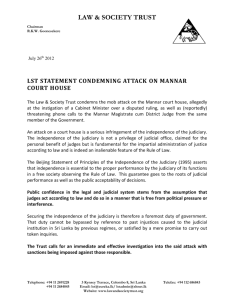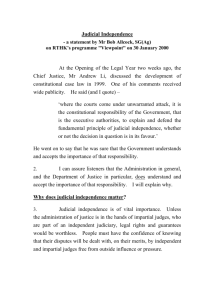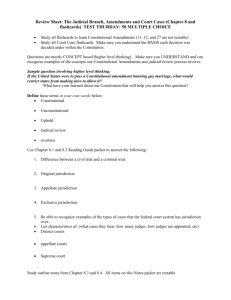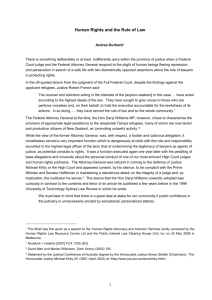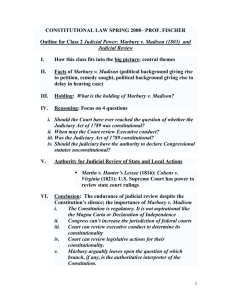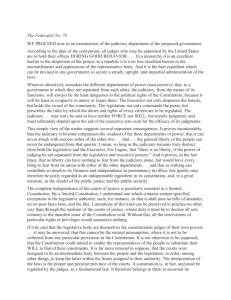Disposition of Complaints via Letter Format
advertisement
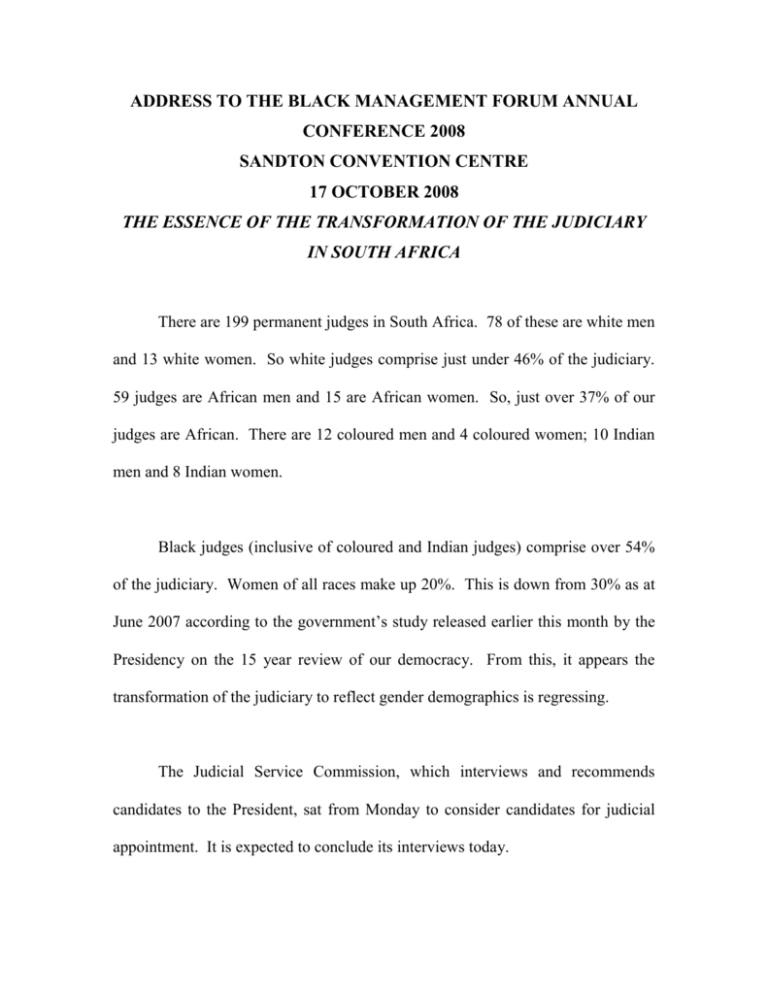
ADDRESS TO THE BLACK MANAGEMENT FORUM ANNUAL CONFERENCE 2008 SANDTON CONVENTION CENTRE 17 OCTOBER 2008 THE ESSENCE OF THE TRANSFORMATION OF THE JUDICIARY IN SOUTH AFRICA There are 199 permanent judges in South Africa. 78 of these are white men and 13 white women. So white judges comprise just under 46% of the judiciary. 59 judges are African men and 15 are African women. So, just over 37% of our judges are African. There are 12 coloured men and 4 coloured women; 10 Indian men and 8 Indian women. Black judges (inclusive of coloured and Indian judges) comprise over 54% of the judiciary. Women of all races make up 20%. This is down from 30% as at June 2007 according to the government’s study released earlier this month by the Presidency on the 15 year review of our democracy. From this, it appears the transformation of the judiciary to reflect gender demographics is regressing. The Judicial Service Commission, which interviews and recommends candidates to the President, sat from Monday to consider candidates for judicial appointment. It is expected to conclude its interviews today. 2 One constitutional court judge is due to retire at the end of this year. He is African. There are 6 candidates who have put themselves up to take his place. 3 of them are white men. There would have been 4 white men but the fourth appears to have been persuaded to withdraw his candidacy by a lobby group in order to accommodate another white man who by all accounts seems tipped to get the nod at least from the JSC. Our new President will then have to decide whether the replacement of an African constitutional court judge by a white man is desirable in light of the legislative framework to transform South African society in all its manifestations. On Monday, we heard that an African candidate for the constitutional court has also withdrawn his candidacy. Tuesday, yet another candidate withdrew. Naturally, no reason was advanced for these withdrawals. Now on e-tv commentators propound the line that these are casualties of the constitutional court complaint against the Cape Judge President. I find that laughable. This of course leaves the door wide open for the white man preferred by the lobby group to get the nod because all credible competitors for the position have in my view been persuaded by a lobby group to stand aside and perhaps apply next year when another 4 vacancies arise in the constitutional court. This latest development convinces me, more than ever, that the lobby group’s candidate will be appointed to the constitutional court unless our new president considers the 3 matter very carefully by applying the criteria upon which the ANC resolved in Polokwane last year. In my respectful view, if one considers at least one of this judge’s most recent judgments, he does not meet that criteria and it would be a mistake to appoint him at this stage. In September next year, 4 more judges of the constitutional court are due to retire. 2 of them are African and include the chief justice. The other 2 are white. Again, when the JSC proposes names to the President next October, the challenge for our new President will be to consider the desirability of replacing African constitutional court judges with white persons. Leadership of the judiciary – at least on the face of it – is firmly in African hands. The Chief Justice is African. His deputy is African. The President of the Supreme Court of Appeal is African. All the Judges President (the Heads of the various High Courts) are African, except for the Acting Judge President of the Cape High Court who is a white woman (Surprise! Surprise!). These are the numbers. These are the facts. The numbers seem to me to show that if the measure of the transformation of the judiciary is the racial composition of our judges, then the government led by the ANC can pat itself on the back for a job well done. But is that all there is to transformation of the 4 judiciary? Is the essence of judicial transformation the racial composition of our judiciary? In my view, hardly. The ruling party’s view on this issue is rather revealing and we cannot ignore it. Since it came into power in 1994, never once has the African National Congress adopted a resolution at its national conference that judicial transformation involves the racial composition of the judiciary. So when a judge of the Supreme Court of Appeal publicly criticises government policy of appointing what she terms “unskilled and inexperienced” black judges over “worthy” white judges, I shudder to think how she arrives at her judgments. Government policy is informed by the ruling party’s policies. There is no ANC policy that black judges must be appointed over more worthy white judges. Perhaps the Supreme Court of Appeal judge can point us to the source of her information. On the subject of judicial transformation, the ANC has rather tended to focus on accessibility of the courts through both geographic proximity to the people the courts are intended to serve; the use of all official languages in the courts to facilitate accessibility of justice; the restructuring or rationalisation of the court system to take on board community courts and traditional courts. 5 Let us trace briefly what the ANC seems to have in mind by “Transformation of the Judiciary”. If the resolutions taken at its national conferences since 1994 are any indication, then to the ANC race does not seem to have anything to do with judicial transformation. This should really come as no surprise given the broad nature of the church called the ANC. Its membership comprises all the colours of what Archbishop Emeritus Mpilo Tutu termed the rainbow nation. At the Bloemfontein national conference in December 1994 the focus as regards transformation of the judiciary was on the establishment of an independent and representative prosecuting authority, including the possibility of setting up a central office of the attorney-general (now NDPP) and the restructuring of the courts to take on board issues of community courts, traditional courts and mechanisms to ensure accessibility. An African man was then appointed in July 1998 to lead the prosecuting authority, and was later succeeded by another African man. No resolution was taken at the Bloemfontein conference to the effect that judicial transformation entails a wholesale appointment of black judges. No such resolution was taken at the Mafikeng national conference in December 1997 either. At that national conference, the ANC’s focus was on the 6 rationalisation of the magistracy and judiciary into a single judiciary; the rationalisation of the court system to provide, at least, for a High Court in each province, which is to be situated in the capital of such province; the establishment of specialised family courts to adjudicate on and deal with all family related matters; the establishment of community courts; the provision of a training programme for judicial officers intended to sensitise the judiciary and to set up a grievance procedure and mechanisms for complaints against judicial officers. At the Stellenbosch national conference in December 2002 the focus was on speeding up legislation to create a grievance procedure to deal with complaints against judicial officers; expediting the transformation of the Judiciary by creating a more representative, competent, sensitive, humane and responsive judiciary; prioritising crimes against women and children, especially rape, and strengthening the victim empowerment system. I am not sure what was meant by creating a more “representative” judiciary. Was the intention to create a racially representative judiciary? That is a possibility if one considers the number of black judges today in comparison to 1994. Was the intention to create a gender representative judiciary? Again, that is a possibility if one compares the number of women judges today to that in 1994, and the former 7 President’s penchant for women empowerment. The judge of the Supreme Court of Appeal who now criticises government for a non-existent policy forgets that she herself is a beneficiary of government empowerment of women. In my view there is another possibility – philosophical inclination. If I were in government and intent on transforming the judiciary I would focus less on race and gender and more on the philosophical make-up of each candidate. I shall return to this proposition later. Last December in Polokwane, no less than 15 resolutions were taken in relation to the transformation of the judiciary. Not one of them proposed that judicial transformation entails swelling the ranks of the higher courts with black judges. These are the resolutions: 1. A single, integrated, accessible and affordable court system must be established, including the integration of the Judicial Service Commission (JSC) and the Magistrates Commission (MC) into a single appointment mechanism and the establishment of a single grievance procedure for judicial officers. 2. The Constitutional Court should be the highest (apex) court for all matters, constitutional and non-constitutional. 8 3. The High Court system should be rationalised into a single High Court, with each province having, at least, a division of the high court. 4. The Labour Appeal Court should be integrated into the SCA, as a separate chamber. The Labour Court should be integrated into each division of the High Court, possibly as separate Chambers. The creation of further specialised courts outside the single court system should be discouraged. 5. Outdated court descriptors (titles / descriptions) should be renamed. For example, the Transvaal Provincial Division, Transkei High Court, Bophuthatswana High Court, Ciskei high Court would all have to be renamed. 6. Regional Courts to deal with civil matters should be established and the functions of the old "black" Divorce Courts must be taken over by the new Regional Civil Magistrates Courts. 7. "Community" courts, municipal courts and small claims courts must be promoted and expanded where practical and practicable. 8. Traditional courts must be aligned with the new constitutional dispensation and particular attention must be paid to the incorporation and development of our indigenous law. 9. Court governance of both higher courts and the magistrates’ courts must be integrated within a single judiciary, with the Chief Justice as the head of the judiciary. 10. While the independence of the judiciary and the rule of law must be respected, and the judiciary must adjudicate without fear, favour or prejudice, the judiciary should nonetheless also respect the areas of responsibility of other arms of the state and not unduly encroach in those areas. 11. The Chief Justice, as head of the judicial authority, should exercise authority and responsibility over the development and implementation 9 of norms and standards for the exercise of all judicial functions, such as the allocation of judges, cases and court rooms, while the administration of courts, including any allocation of resources, financial management and policy matters relating to the administration of courts, are the ultimate responsibility of the Minister of Justice. 12. There must be a single rule-making mechanism for all courts, which is inclusive of all role players, to process rules through the Rules Board, which is a specialist advisory body consisting mainly of legal practitioners, with the rules being approved by the Minister and Parliament, and in the process of adopting rules to allow for public participation. 13. Every person must enjoy the right to use an official language of his or her choice in all court proceedings of first instance. In appeals and reviews against the findings of the court of first instance, the record must be typed in English. Court process like summons and writs of execution should be produced and printed in English and, if it is the wish of a litigant, in one other official language, as prescribed. 14. Judicial training and skills development of our judiciary is nonnegotiable and must be vigorously pursued. Appropriate mechanisms must be urgently established to pursue the priority of establishing an adequate pool of judicial officers who are steeped in and reflect the progressive values of our constitution. 15. This resolution, including past resolutions, must be urgently implemented by the end of the present term of government. 10 While some of these resolutions are new, others have been adopted in previous national conferences since December 1994. One of the new resolutions taken at the Polokwane national conference in December last year was this: “Appropriate mechanisms must be urgently established to pursue the priority of establishing an adequate pool of judicial officers who are steeped in and reflect the progressive values of our constitution.” In my view, this is the single most important resolution that the ANC has taken in relation to the transformation of the judiciary in South Africa over the last 15 years. The resolution captures in my view the essence of judicial transformation. It is the benchmark against which all judicial appointments must be measured. But what are the “progressive values of our constitution” in which the new breed of judges must be steeped? The answer lies ineluctably in our national constitution. The progressive values of our constitution are human dignity, equality and freedom. They are not what politicians say they are from time to time, which may change according to the agenda sought to be achieved at a given time. No, they remain constant. 11 For example, section 1 of the constitution says South Africa is founded on human dignity, the achievement of equality and the advancement of human rights and freedoms. These three constitutional values are the foundation of the Bill of Rights Chapter in our national constitution in terms of section 7. They are also the measure by which the reasonableness and justifiability of the limitation of other rights in the Bill of Rights Chapter must be gauged. In other words, in order to determine whether or not the limitation of, say, freedom of expression or freedom of movement and residence is reasonable and justifiable, a judge must have regard to the effect that such limitation has on human dignity, equality and freedom. In this regard, section 36(1) of the Constitution provides as follows: “The rights in the Bill of Rights may be limited only in terms of law of general application to the extent that the limitation is reasonable and justifiable in an open and democratic society based on human dignity, equality and freedom . . . .” What is more, these three values are also a central feature in the interpretation of the Bill of Rights Chapter. In this regard, section 39(1) says: “When interpreting the Bill of Rights, a court, tribunal or forum - 12 (a) must promote the values that underlie an open and democratic society based on human dignity, equality and freedom” So, these three values are not only fundamental rights under the Bill of Rights Chapter in themselves; they are also the values on which the country called South Africa is founded. And they are the essence with regard to which the Bill of Rights Chapter must be interpreted. In short folks, without human dignity; without equality; without freedom – there is no country; there is no Bill of Rights. Now, these constitutional values which the ANC says all judicial officers must be steeped in are not the sole preserve of any one racial or gender group. I am not aware of any empirical evidence that a black judge is more likely to espouse and apply these values than a white judge. That is not what I understand the ANC to be saying by this resolution. In fact, if one considers some of the things done by the constitutional court, which is 72% black, one finds that these things are not in my view consistent with these values. I could give you examples but since I am counsel in a matter involving constitutional court judges, I think it prudent that I do not go into much detail lest I am accused of attacking the judiciary. When the case is finalised I think there are things that need saying about the judiciary and I shall say them then. But this is neither the appropriate time nor the appropriate forum to raise those issues. 13 The simple point I make here is that a progressive judge who is steeped in constitutional values is not necessarily black. Such a judge is not necessarily white either. There is no empirical evidence that a white judge is better equipped to apply these constitutional values than a black judge. In fact, in October last year the Supreme Court of Appeal, which is 60% white, issued a ruling that where an employee had been found guilty of misconduct the determination of a sanction is the sole preserve of the employer and that the CCMA cannot interfere with the employer’s decision in that regard – however unfair. The author of that judgment was the very white man now being championed by a lobby group for appointment to the constitutional court. Now, equality includes equal protection and benefit of the law, and equality is one of the values on which South Africa is founded. If only the employer has a say as regards whether or not an employee must be fired (under the guise of a reasonable employer test), then how on earth can the employee enjoy equal protection of the law when he cannot challenge the employer’s decision to fire him at the CCMA without reference to what a reasonable employer would have done in the circumstances? position. Thankfully, the constitutional court has corrected that 14 Before that, the Supreme Court of Appeal attributed to the trial court the phrase “generally corrupt relationship” to describe the relationship between Mr Schabir Shaik and the president of the ANC. It later emerged that the trial court judge apparently never made that remark in his judgment in the Schabir Shaik asset forfeiture case. The way had been paved, on wrong facts, by the Supreme Court of Appeal for an inference that the ANC president is corrupt. This was an affront on his human dignity – and human dignity is one of the values on which our constitution is founded. This demonstrates that a white judge (or a group of white judges) is not necessarily better equipped than a black judge to reflect progressive values of our constitution. So, if racial considerations are either inadequate or irrelevant for the establishment of an adequate pool of judicial officers who are steeped in the progressive values of our constitution, then how does the ANC hope to achieve this without being accused of packing the judiciary with people considered to be sympathetic to it? The answer lies in the “appropriate mechanisms” that the ANC establishes in pursuit of that very important goal. I don’t know whether such mechanisms have been established yet and would love to study them and even offer to help in the national interest. In my view, it is relatively easier to gauge the progressiveness of candidates coming up for appointment to the constitutional court, the Supreme Court of 15 Appeal and the High Court where those candidates have previously acted as judges or held judicial office in the lower courts. From their written judgments one can determine whether or not, and the extent to which, they are steeped in and reflect the progressive values of our constitution. The difficulty arises where the candidates are academics and attorneys and advocates who have never before acted as judges or magistrates. I am from the school that believes that such people should never be considered for permanent judicial office without a reasonable number of acting appointments under their belts, and a reasonable number of reported judgments from which one can gauge whether they meet the required standard. A clever academic does not a wise judge make. Instead you tend to get long judgments with elusive rationes. In conclusion then, the essence of judicial transformation lies not in packing the courts with black judges. It lies rather in packing the courts with judges who are genuinely beholden to the constitution and the fundamental values thereof. It seems to me the Supreme Court of Appeal judge who attacks government for doing that for which the constitution provides is clearly not beholden to the constitution to which she has sworn allegiance. Since 1994 the former presidents have made mistakes in some of their judicial appointments. It is my sincere hope that the “appropriate mechanisms” of 16 which the ANC speaks in its 2007 resolution with a view to establishing a pool of progressive judges steeped in the values of our constitution will be put in place soon so that mistakes of the past are not repeated. When appointing a candidate recommended by the JSC the president must always bear this in mind: appointing a judge is like giving birth. Once done, it cannot be undone. Firing a judge is not a matter of labour relations. It is considerably more serious than that and so, fittingly, considerably difficult to do. So if you make a mistake in appointing a judge who does not reflect the “progressive values of our constitution” but simply says he does, you are stuck with him until he reaches retirement age. Who knows, the lobby group may even prevail on our president to extend the retirement age for judges from 72 to 80, thereby ensuring their man and their insalubrious ideas are irreversibly entrenched in the nation’s legal framework. In my view, that is the threat to our democracy. I say the genuine transformation of our judiciary must begin with the candidates now sitting for interviews before the JSC. This nation cannot afford to miss this opportunity to transform its judiciary for good. The constitutional court and the Supreme Court of Appeal are particularly crucial in that transformative drive because they have the final say. ______________________________________________


